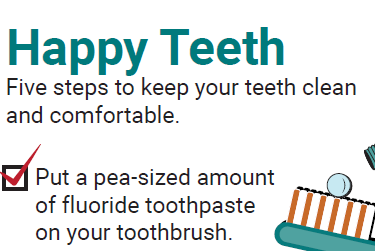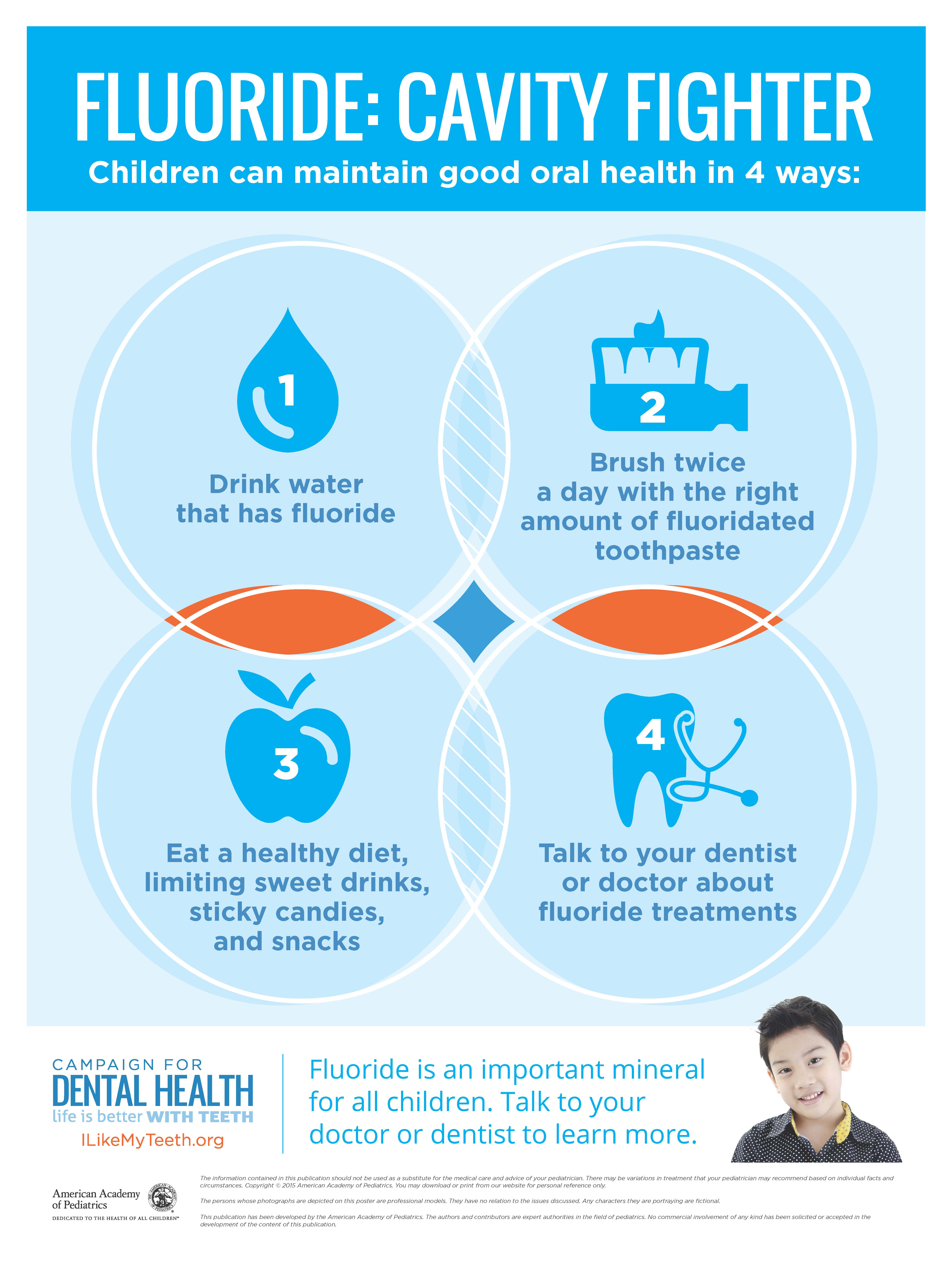Fluoride: Nature's Way of Preventing Tooth Decay
Fluoride is naturally found in most water sources: rivers, lakes, wells, and even the oceans. For the past 75 years, fluoride has been added to public water supplies to bring fluoride levels up to the amount necessary to help prevent tooth decay.
In the United States, water fluoridation is not the only form of fluoride delivery that is effective in preventing tooth decay in people of all ages. Use the information listed below to compare the other fluoride products that may lower the risk for tooth decay, especially for people who are at higher risk for decay.
Although these products reduce tooth decay, combined use with fluoridated water offers protection greater than any of these products used alone.
Topical Fluorides
Topical fluorides encourage the remineralization of enamel and inhibit bacterial metabolism, reducing the growth of plaque bacteria. Modes of topical fluoride delivery include:
- Toothpastes
- Gels
- Mouth rinses
- Varnishes
- Professionally applied fluoride therapies
Fluoride Supplements
Fluoride supplements are available by prescription only and are beneficial for children who aren't ingesting enough fluoride through their water supply and diet. According to the American Dental Association, children aged 6 months to 16 years who aren't drinking fluoridated water and have a high risk for tooth decay can reap crucial benefits from oral fluoride supplements such as:
- Tablets
- Lozenges
- Liquids
- Chewing gums
Community Water Fluoridation
Because of the important role community water fluoridation has played in the reduction of tooth decay, the Centers for Disease Control and Prevention (CDC) has proclaimed community water fluoridation one of 10 great public health achievements of the 20th century.
Utilize this free resource designed by the CDC to build the capability of state fluoridation programs and to help increase knowledge and refine skills to implement and maintain community water fluoridation.
South Carolina Community Water Fluoridation Fact Sheet
Community water fluoridation continues to be the most cost-effective, equitable and safe means to provide protection from tooth decay in our community.
For more information and resources on fluoridation, visit https://scdhec.gov/health/oral-health/child-and-teen-oral-health/fluoridation
Downloadable Resource
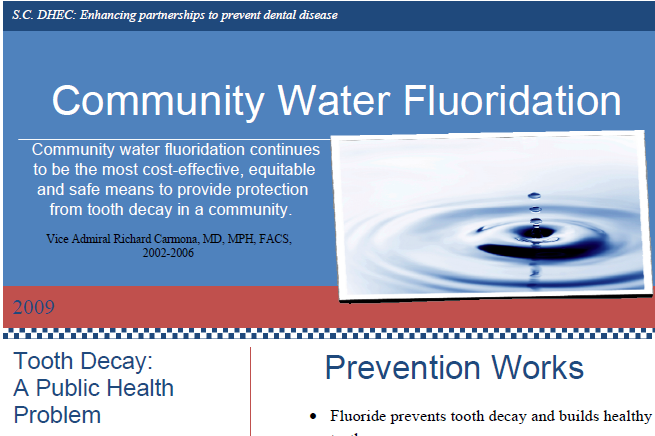
Dental Sealants
According to the CDC, “Dental sealants are thin coatings that when painted on the chewing surfaces of the back teeth (molars) can prevent cavities (tooth decay) for many years. Sealants protect the chewing surfaces from cavities by covering them with a protective shield that blocks out germs and food. Once applied, sealants protect against 80% of cavities for 2 years and continue to protect against 50% of cavities for up to 4 years.”
- Public Health Manual, DHEC Dental Prevention Program PDF
- School-Based Dental Prevention Program PDF
- Public Health Dental Prevention Program
- Dental Sealants in South Carolina: A Fact Sheet
Downloadable Resources
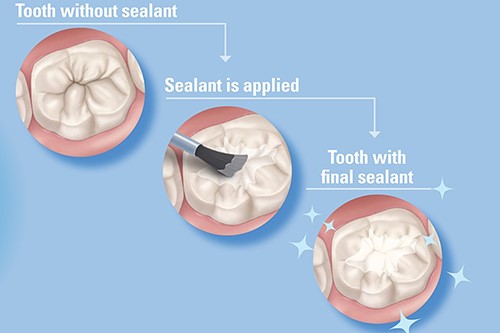

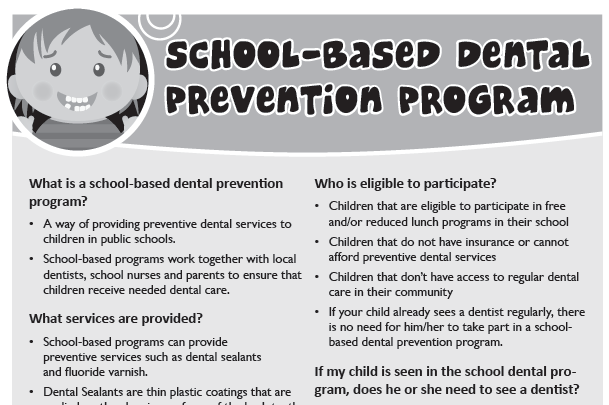
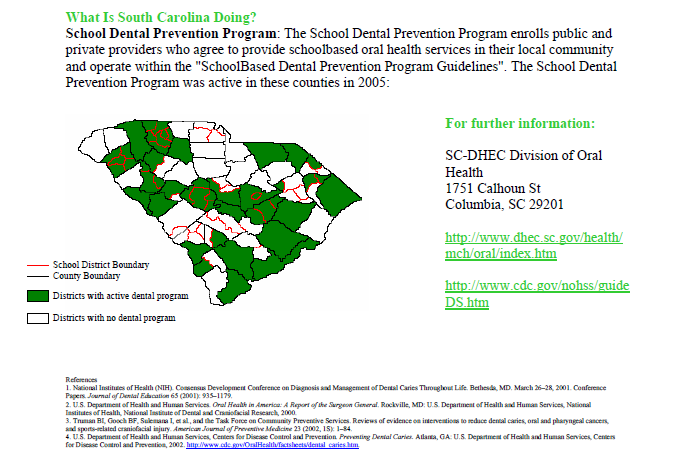
Cancer Prevention
More than one-third of all cancer patients develop complications that affect the mouth, according to the National Institute of Dental and Craniofacial Research. These mild to severe side effects can include mouth sores, infection, dry mouth, sensitive gums, and jaw pain.
Your mouth health is an important part of your overall health, so make your dentist part of your cancer care team.
Adolescent Immunization
HPV is the leading cause of oropharyngeal cancers; primarily the tonsils, tonsillar crypt, the base of the tongue (the very back of the mouth and part of what, in lay terms, might be called a part of the throat), and a very small number of front of the mouth, oral cavity cancers. HPV16 is the version most responsible and affects both males and females. The HPV vaccine protects against the types of HPV that can cause oropharyngeal cancers, so it may also prevent oropharyngeal cancers. The CDC recommends HPV vaccination for 11- to 12-year-olds and also recommends the HPV vaccination for everyone through age 26 years, if not vaccinated already.
Resources
- Yul Byrnner Head and Neck Cancer Foundation
- Perform a Death Defying Act
- Detecting Oral Cancer: A Guide for Healthcare Professionals
Poster and pamphlet that provide an illustrated guide to an oral cancer exam. Contains full-color photographs depicting each stage of the exam. - Oral Cancer Head and Neck Assessment
- American Dental Association's Overview of Oral Cancer
This web page provides the patient with an overview of oral cancer and the risk factors for oral cancer. - Oral Cancer (pdf)
This pamphlet describes risk factors, signs, and symptoms of oral cancer and emphasizes the importance of detecting the disease in its early stages. - Oral Care Provider's Reference Guide for Oncology Patients
This guide provides a quick reference for treating patients before, during, and after cancer treatment. It includes questions to ask the patient's oncology team before cancer treatment begins. - Oral Complications of Cancer Treatment: What the Oral Health Team Can Do
This fact sheet discusses preventing and managing complications common to a patient's cancer treatment. The role of dental professionals before, during, and after treatment is also included. - Chemotherapy and Your Mouth
This patient brochure discusses how chemotherapy affects the mouth and the importance of seeing a dentist before, during, and after treatment. Self-care tips for patients to keep their mouth healthy during treatment are also included. - Head and Neck Radiation Treatment and Your Mouth
This patient brochure discusses how radiation affects the mouth and the importance of seeing a dentist before, during, and after cancer treatment. Self-care tips for patients to keep their mouth healthy during treatment are also included. - Three Good Reasons to See a Dentist
This patient brochure discusses reasons to see a dentist before cancer treatment, how to protect the mouth during treatment, and advice on when to call the cancer care team about mouth problems. Self-care tips are also provided.
Additional Resources
